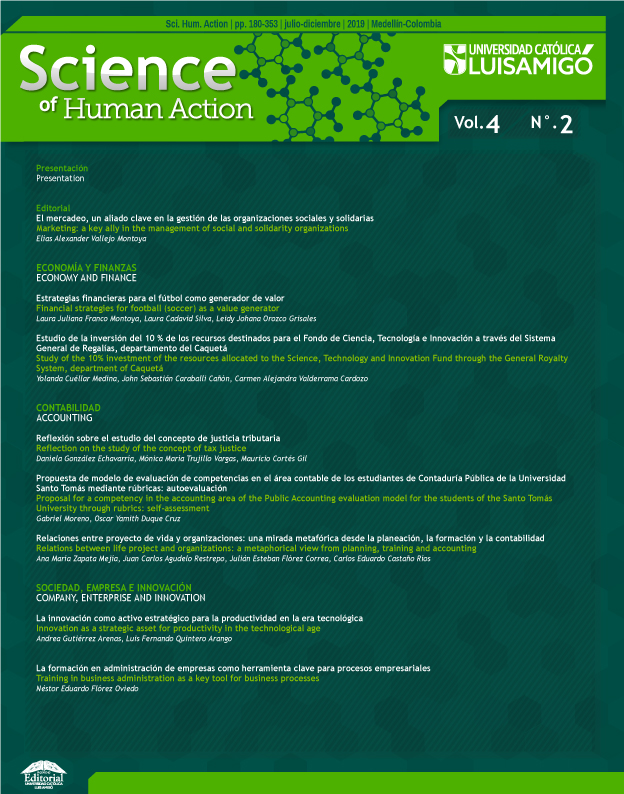Reflection on the study of the concept of tax justice
DOI:
https://doi.org/10.21501/2500-669X.3495Keywords:
Tax justice, Fiscal sociology, Public finance, Tax research, Tax accountingAbstract
The theme raised for the development of this article is the concept of justice in the tax field, dealing with different nuances of it and its possible economic, social and political implications. The main objective for its elaboration was to analyze the concept of tax justice, within the framework of the taxes that are assigned at the different economic levels found in society. It is developed in an organized way, based on three main themes that cover the sociological, research and tax fields. For its development, the article presents the reflection built based on documentary reviews.
Taking into account the above, various positions are reviewed. The concept of justice lends itself to obtain several definitions that adapt to the context in which it is used, linking this concept with notions such as equity, society, equality, politics, evasion and fraud. In addition, this concept defines the taxes that each taxpayer must contribute to the Treasury, so that there is equity between the State and society, without neglecting the needs of different governments for the proper functioning and fulfillment of the basic needs of each individual.
Downloads
References
Bolaños Bolaños, L. (2017). Justicia tributaria como principio constitucional en el Estado social de derecho. Revista de Derecho, (48), 54-81. doi: http://dx.doi.org/10.14482/dere.48.10141
Corona, J., y Díaz, A. (2003). Introducción a la hacienda pública (2da edición). Barcelona Editorial Ariel: Barcelona.
Corte Constitucional (1998). Sentencia C-183 de 1998. Demanda de inconstitucionalidad contra el artículo 476 (parcial) del Decreto 624 de 1989, "Por el cual se expide el Estatuto Tributario de los impuestos administrados por la Dirección General de Impuestos Nacionales". Bogotá. Recuperado de http://www.corteconstitucional.gov.co/relatoria/1998/c-183-98.htm
Morales Manchego, M. (31 de julio de 2018). Las rutas de evasión de impuestos que tendrá que atacar el gobierno. Portafolio. Recuperado de https://www.portafolio.co/economia/las-rutas-de-evasion-de-impuestos-que-tendra-que-atacar-el-gobierno-519537
Pacheco Carrascal, M. A. (2017). Aportes de la economía conductual a la comprensión del comportamiento tributario: una aproximación al caso de los contribuyentes en la ciudad de Bogotá (Tesis de maestría). Bogotá: Universidad Nacional de Colombia. Recuperado de http://bdigital.unal.edu.co/64345/
Pastor Arranz, L. (2015). Metodología de la sociología fiscal: enfoque internacional en la investigación sociológica. En: E. González García, A. García Muñoz, J. García Sansano y Iglesias Villalobos, L. (Coords). Mundos emergentes: cambios, conflictos y expectativas. Toledo: ACMS.
Rodríguez Múnera, M. (25 de noviembre de 2003). Revisar las exenciones tributarias. El Tiempo. Recuperado de https://www.eltiempo.com/archivo/documento/MAM-1028992
Steuerle, E. C. (2002). And Equal (Tax) Justice for All? Urban Institute Press. Retrieved from https://www.urban.org/sites/default/files/steuerle-excerpt.pdf
Vargas Restrepo, C. M. (2012). El principio de justicia en la tributación. Económicas CUC, 33(1). 9-32. Recuperado de https://revistascientificas.cuc.edu.co/economicascuc/article/view/183
Downloads
Published
How to Cite
Issue
Section
License
PUBLICATIONS POLICY
• The author must send completed the declaration of transfer of economic rights and declaration of conflicts of interest, which will be provided by the management of the magazine. This document indicates the originality of the article, which is not published in another medium and that is not simultaneously postulated in another journal.
• The author will transfer all rights to the article to the journal Science Of Human Action.
• Once the evaluation of the article has begun, the authors agree not to withdraw it until the end of the process.
• The Science Of Human Action journal will submit the articles received for initial evaluation by the Editorial Committee, in case the Committee finds the material pertinent, it will be evaluated by two anonymous referees who will determine if it is publishable. If one referee approves and the other rejects it, a third party will be appointed.
• The address of Science Of Human Action will answer within a maximum of three (3) days about the receipt of the contribution received from the author.
• Printed items will not be received. All the proponents will have to send their writings through the e-mail of the magazine.
• Partial versions of the text will not be received, that is, those that are not structurally adjusted to the type of article.
• Once the article is sent, it is understood that the author authorizes the publication of these data.
• The reception of articles does not imply an obligation to publish them. The authors are directly responsible for the ideas, judgments and opinions expressed in the articles; in such a way that the content does not compromise the thinking of the Editorial Committee or the Institution.
• Once the article is submitted, it is understood that the author authorizes the publication of the data corresponding to the author's note.
• This is an open access journal that does not charge authors for either the editorial process or the publication. All costs of editorial production are assumed by the Luis Amigó Catholic University.
ETHICS OF PUBLICATION
• The Editorial Committee, by virtue of transparency in the processes, will ensure the academic quality of the journal.
• Causes of rejection are considered: plagiarism, adulteration, invention or falsification of content and author data, which are not original and unpublished.
• In no case, the journal's management will require the author to cite it or publish articles with conflicts of interest.
• If once the article is published: 1) the author discovers substantive errors that threaten the quality or scientificity, may request its removal or correction. 2) If a third party detects the error, it is the obligation of the author to retract immediately and proceed to the public removal or correction.


